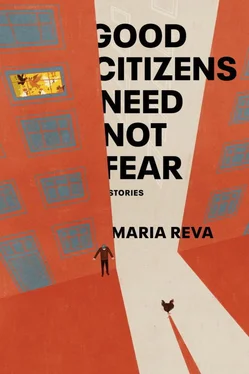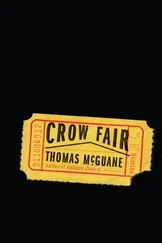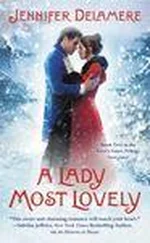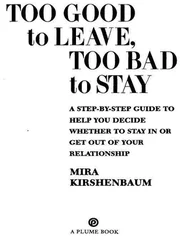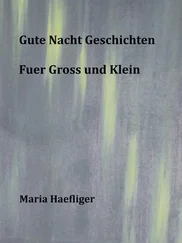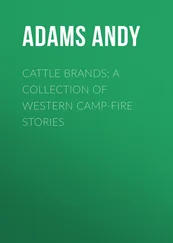Maria Reva - Good Citizens Need Not Fear - Stories
Здесь есть возможность читать онлайн «Maria Reva - Good Citizens Need Not Fear - Stories» весь текст электронной книги совершенно бесплатно (целиком полную версию без сокращений). В некоторых случаях можно слушать аудио, скачать через торрент в формате fb2 и присутствует краткое содержание. Город: New York, Год выпуска: 2020, ISBN: 2020, Издательство: Doubleday, Жанр: Современная проза, humor_satire, на английском языке. Описание произведения, (предисловие) а так же отзывы посетителей доступны на портале библиотеки ЛибКат.
- Название:Good Citizens Need Not Fear: Stories
- Автор:
- Издательство:Doubleday
- Жанр:
- Год:2020
- Город:New York
- ISBN:978-0-38554-529-7
- Рейтинг книги:3 / 5. Голосов: 1
-
Избранное:Добавить в избранное
- Отзывы:
-
Ваша оценка:
- 60
- 1
- 2
- 3
- 4
- 5
Good Citizens Need Not Fear: Stories: краткое содержание, описание и аннотация
Предлагаем к чтению аннотацию, описание, краткое содержание или предисловие (зависит от того, что написал сам автор книги «Good Citizens Need Not Fear: Stories»). Если вы не нашли необходимую информацию о книге — напишите в комментариях, мы постараемся отыскать её.
Good Citizens Need Not Fear: Stories — читать онлайн бесплатно полную книгу (весь текст) целиком
Ниже представлен текст книги, разбитый по страницам. Система сохранения места последней прочитанной страницы, позволяет с удобством читать онлайн бесплатно книгу «Good Citizens Need Not Fear: Stories», без необходимости каждый раз заново искать на чём Вы остановились. Поставьте закладку, и сможете в любой момент перейти на страницу, на которой закончили чтение.
Интервал:
Закладка:
Milena Markivna entered the apartment a few minutes later, with a soft scratch of keys. After shrugging off her long black raincoat to reveal the bleach-flecked smock underneath—a marvelous imitation of a custodial uniform—she appraised me as I imagined she might appraise a rug her husband had fished out of a dumpster. Would the piece be useful, or would it collect dust and get in the way? Her expression suggested the latter, but her husband was leading me into the kitchen, the point of no return. Once a guest steps into the kitchen, to let them leave without being fed and beveraged is of course unconscionable.
Milena Markivna leaned her hip against the counter, watching Konstantyn Illych mete out home brew into three cloudy shot glasses. “Lena, fetch the sprats, will you?”
Milena Markivna indicated she needed the stool, which I immediately vacated. She stepped up on it to retrieve a can from the back of the uppermost cupboard, then set the can down on the table, with some force, and looked at me, also with some force, presumably daring me to do something about the unopened sprats. I produced the eight-layer pocketknife I always kept on my person. In an elaborate display of resourcefulness, I flicked through the screwdriver, ruler, fish scaler and hook disgorger, scissors, pharmaceutical spatula, magnifying lens, hoof cleaner, shackle opener, and wood saw, before reaching the can opener. Its metal claw sank into the tin with so little resistance, I could have been cutting margarine. Milena Markivna must have noticed the surprise on my face. She asked if I knew about the exploding cans.
I conceded I did not.
“It’s something I heard,” she said, “something about the tin, how they don’t make it like they used to. People are getting shrapnel wounds.” After a pause, she gave a dry mirthless laugh and so I laughed as well.
Before Konstantyn Illych passed around the shots, I laid a sprat on my tongue and chewed it slowly to let the bitter oil coat the inside of my mouth and throat, minimizing the effects of the not-yet-ingested alcohol.
I took note that Milena Markivna also chewed a sprat before the first shot.
Three rounds later, Konstantyn Illych was speaking of the tenets of futurist philosophy. He was about to show how he employed them in his poetry when I jumped in to ask about the letter of apology, due in fifteen days.
“Mikhail Ivanovich,” he said. “Misha. Can I call you Misha?”
“You may.” The home brew was softening my judgment and there was only one sprat left.
“Fuck the letter, Misha. What is this, grade school?”
I told him about the possible repercussions, that he might be fired or arrested. “You’re lucky,” I said. “In earlier times, a political joke meant ten years.”
Konstantyn Illych set his empty shot glass upside down on his index finger like a thimble, twirled it in languid circles. “Once upon a time,” he began.
I wanted to shake the letter out of him.
“I got the flu,” he continued. “Ever get the flu?”
“Sure.”
“The flu turned into bronchitis and I ended up in the hospital. Not only did I get my own room, but by the end of the week the room was filled, and I mean floor-to-ceiling filled, with flowers and cards and jars of food from people I didn’t even know, people from all around the country.”
Milena Markivna placed the last sprat between her lips and sucked it in until the tip of the tail disappeared into her mouth.
Konstantyn Illych leaned in. “Imagine, Misha, what would happen if you tried to get me fired.”
Another week passed without success. My superior remarked that I was usually quicker at obtaining a letter, and was I not dealing with someone who specialized in the written word, who could whip up a heartfelt apology in no time? I considered bribing the poet, but the mere thought felt unnatural, against the grain, against the direction a bribe usually slid. I began to neglect other tasks at work but still believed my persistence with Konstantyn Illych would be rewarded. I admit I thought of Milena Markivna as well, and often. She followed me into my dreams. Throughout my life, she would tell me in those dreams, I had been watched over. She would award me with a certificate signaling my entry into the Honor Guard, would place on my head a special canvas cap with a golden star on its front. I cannot say if this image is true to the initiation ceremony, but it was how I imagined it had happened with my mother. I would wake at night to find myself alone in my dark room but felt no fear. I knew I was being watched over.
The day before the deadline I stood at the back of the town cinema, watching Konstantyn Illych watch Hedgehog in the Fog . Eventually my attention turned to the animated film itself. I had already seen it a number of times and always found it unsettling—similar to the way heights are unsettling. En route to visit his friend for tea, Hedgehog gets lost in the fog that descends on the forest. It isn’t the fog or the forest that troubles me, although they trouble Hedgehog; what troubles me is this: Hedgehog sees a white horse and wonders if it would drown if it fell asleep in the fog. I’ve never understood the question. I suppose what Hedgehog means is: If the white horse stops moving, we would no longer see it in the white fog. But if we no longer see it, what is its state? Drowned or not? Dead or alive? The question is whether Hedgehog would prefer to keep the fog or have it lift only to discover what is behind its thick veil. I would keep the fog. For instance, I cannot know the whereabouts of my parents because they are part of me and therefore part of my personal file and naturally no one can see their own file, just like no one can see the back of their own head. My mother is standing proud among the Honor Guard. My mother is standing elsewhere. She is sitting. She is lying down. She is cleaning an aquarium while riding an elevator. Uncertainty contains an infinite number of certainties. My mother is in all these states at once, and nothing stops me from choosing one. Many people claim they like certainty, but I do not believe this is true—it is uncertainty that gives freedom of mind. And so, while I longed to be reassigned to Moscow and look for my parents, the thought of it shook me to the bones with terror.
When the film ended, I felt a damp breath on the back of my neck. Milena Markivna’s voice whispered: “Meet me at the dacha at midnight. I’ll get you the letter.”
It was a weekday, a Wednesday, and so the dachas were empty of people. The swamps were still flooded, but this time a sleek black rowboat waited for me. It barely made a seam in the water as I rowed. Northward, the overcast sky glowed from the lights of the town. My teeth chattered from cold or excitement or fear—it is difficult to keep still when one knows one’s life is about to change. Already I could feel, like a comforting hand on my shoulder, the double gold aiguillette worn by the Guard. The tall chrome leather boots tight around my calves.
I tried to retrace the route I had taken the first time I visited the dacha, but found myself in the middle of a thicket of cattails. The glow of the sky suddenly switched off. (Normally electricity is cut not at night but in the evening, when people use it most, and thus the most can be economized—this is the thought I would have had had I not been engulfed in panic.) Darkness closed in on me. I circled on the spot. The cattails hissed against the edge of the boat. Willow branches snared my arms and face. A sulfurous stench stirred up from the boggy water. Milena Markivna had given me the simplest of tasks and I was about to fail her.
A horizontal slit of light appeared in the distance, faint and quivering. I lurched the boat toward it. Soon I recognized the silhouette of the shack on stilts, the light emanating from under its door. I scrambled up the stairs, knocked. The lock clicked and I waited for the door to open, and when it did not, I opened it myself.
Читать дальшеИнтервал:
Закладка:
Похожие книги на «Good Citizens Need Not Fear: Stories»
Представляем Вашему вниманию похожие книги на «Good Citizens Need Not Fear: Stories» списком для выбора. Мы отобрали схожую по названию и смыслу литературу в надежде предоставить читателям больше вариантов отыскать новые, интересные, ещё непрочитанные произведения.
Обсуждение, отзывы о книге «Good Citizens Need Not Fear: Stories» и просто собственные мнения читателей. Оставьте ваши комментарии, напишите, что Вы думаете о произведении, его смысле или главных героях. Укажите что конкретно понравилось, а что нет, и почему Вы так считаете.
